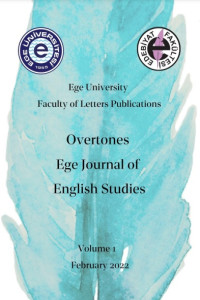Multiplicity of Self and Space in Semi-autobiographical Speculative Fiction: Doris Lessing’s The Memoirs of a Survivor and Joanna Russ’s The Female Man
Abstract
Speculative fiction has always provided a suitable ground for contesting social constructions such as
strict gender roles and conventional views on sexuality. In the 1970s especially, with the influence of second
wave feminism, speculative fiction authors began to depict the political struggle of women in fictional universes
which presented alternative modes of subjectivity and social structures. Doris Lessing’s The Memoirs of a
Survivor (1974) and Joanna Russ’s The Female Man (1975) make use of the historically-situated nature of
speculative fiction to narrate their experiences, reflect personal as well as political struggles in fictional alternate
and future worlds which are indeed reflections of the here and now. Both Lessing and Russ combine
autobiographical and fictional elements in their exploration of female subjectivity and experience. This
preference leads to a more genuine, less generalized impression of female identity and solidarity. In The
Memoirs of a Survivor, described as “an attempt at autobiography” by its author, Lessing integrates personal
experiences from her own life into the text while exploring a post-apocalyptic, or more precisely, a post-“Crisis”
world. Although the events take place in a fictional future, they are influenced by the author’s past in real life.
Similarly, in The Female Man, Russ adds autobiographical elements into the text, especially her experiences as a
lesbian feminist and her struggle to exist in male-dominated environments. FM presents four different alternate
narratives, two of which take place in the future (one is a utopia and the other is a dystopia); however, all of
them express a different version of women’s, and of course Joanna Russ’, struggle in life. Both FM and Memoirs
therefore reflect the multiplicity and plurality of the voices of women, and by employing speculative fiction
tropes, they point to diverse ways of confronting oppressive ideologies both collectively and individually.
References
- Anderson, Linda. Autobiography: The New Critical Idiom. London: Routledge, 2001.
- Barr, Marleen S. “Feminist Fabulation.” in A Companion to Science Fiction. Ed. David Seed. Oxford: John Wiley & Sons, 2008. 142-55.
- Boulter, Amanda. “Unnatural Acts: American Feminism and Joanna Russ’s The Female Man.” Women: A Cultural Review 10.2. (1999): 151-66. Conway, Jill Ker. When Memory Speaks: Exploring the Art of Autobiography. New York: Vintage, 1999.
- DuPlessis, Rachel Blau. “The Feminist Apologues of Lessing, Piercy, and Russ.” Frontiers: A Journal of Women Studies, 4.1 (Spring, 1979): 1-8.
- Gudmundsdóttir, Gunnthórunn. Borderlines: Autobiography and Fiction in Postmodern Life Writing. New York: Rodopi, 2003.
- Haegert, John. “Autobiography as Fiction: The Example of ‘Stop-Time.’” Modern Fiction Studies 33. 4 (Winter 1987): 621-38.
- Johnson, Barbara. The Barbara Johnson Reader: The Surprise of Otherness. Eds. Melissa Feuerstein, Bill
- Johnson González, Lili Porten, and Keja Valens. Durham: Duke UP, 2014.
- Lessing, Doris. The Memoirs of a Survivor. London: Flamingo, 1995.
- ———. “‘The Habit of Observing’: Interview with Francois-Olivier Rousseau.” Doris Lessing: Conversations. Ed. Earl G. Ingersoll. Princeton: Ontario Review Press, 1994. 146–54.
- Robinson, Sally. “The ‘Anti-Logos Weapon’: Multiplicity in Women's Texts.” Contemporary Literature 29.1 (Spring, 1988): 105-24.
- Rubenstein, Roberta. Literary Half-Lives: Doris Lessing, Clancy Sigal, and Roman à Clef. New York: Palgrave Macmillan, 2014.
- Russ, Joanna. The Female Man. London: Gollancz, 2010.
- ———. “Reflections on Science Fiction: An Interview with Joanna Russ.” in Building Feminist Theory: Essays from “Quest A Feminist Quarterly”. New York: Longman, 1981.
- Shinn, Thelma. Worlds within Women: Myth and Mythmaking in Fantastic Literature by Women. New York: Greenwood, 1986.
- Silbergleid, Robin. “Women, Utopia, and Narrative: Toward a Postmodern Feminist Citizenship.” Hypatia: Citizenship in Feminism: Identity, Action, and Locale 12.4. (Autumn 1997): 156-77.
- Spencer, Kathleen L. “Rescuing the Female Child: The Fiction of Joanna Russ.” Science Fiction Studies: Science Fiction by Women 17.2 (Jul., 1990): 167-87.
- Wolf-Meyer, Matthew J. Theory for the World to Come: Speculative Fiction and Apocalyptic Anthropology. Minneapolis: U of Minnesota P, 2019.
Details
| Primary Language | English |
|---|---|
| Subjects | British and Irish Language, Literature and Culture, Literary Studies, Literary Theory |
| Journal Section | Research Articles |
| Authors | |
| Publication Date | February 21, 2022 |
| Submission Date | September 15, 2021 |
| Published in Issue | Year 2022 Issue: 1 |


